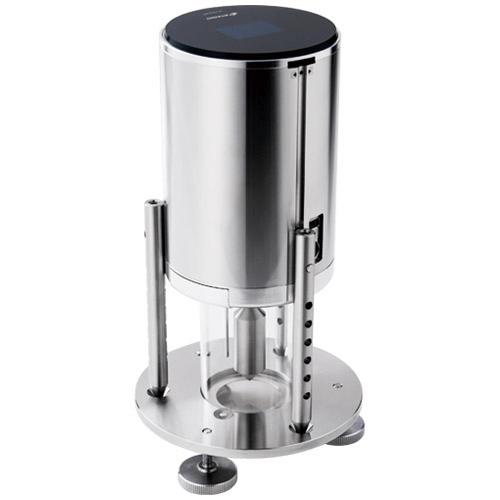Introducing Viscometers!

Viscometers are critical quality management tools. So, if you're involved in the production process of industries such as food, beverage, chemical, and the manufacturing of essential household goods, here's everything you need to know!
What is a Viscometer, and what does this instrument measure?
A Viscometer is a device that measures the viscosity of a fluid.
Viscosity describes a fluid's internal resistance to flow. Different types of liquids have different viscosities. Importantly, fluids with varying viscosities flow at different speeds when the same force is applied. A fluid with a higher viscosity pours slowly and will seem thicker than a liquid with a lower viscosity. Imagine squeezing water and then honey from the same container. You will need more force to extract the honey, which has a higher viscosity than water.
Industrial Applications for a Viscometer
Management in many industries relies heavily on Viscometers to help produce manufactured products of consistent quality that meet the expectations of customers. Here are some examples across different markets.
Food and Beverage
In the food and beverage manufacturing process, measuring viscosity is an essential component of quality. Professionals use Viscometers to measure the thickness and texture of foods, such as the spreadability of jams, the starch breakdown in baked or cooked foods, or the condition of yogurt.
Household Essential Manufacturing
Viscometers are indispensable tools used for benchmarking and ensuring product quality during the manufacture of household essentials. To maintain established standards that keep consumers happy, you need to monitor the viscosity of items like toothpaste, conditioner, shampoo, and cosmetics.
Industrial Chemicals
Key personnel deployed in the production of chemicals need viscometers for the assessment of product quality. Chemical production where viscosity measurement is vital includes paints, varnishes, adhesives, resins, glycerine, hydraulic fluids, lubricants, and cutting fluids.
An Important Example of a Viscometer
Digital viscometer VISCO
Product Code: IC-VISCO
The IC-VISCO is compact, battery-operated, and capable of measuring the viscosity of fluids using a small sample size. The device's compactness and minimal weight make the IC-VISCO very portable. You can move it anywhere an accurate viscosity measurement is needed.
Another benefit of this model is that it allows you to use paper or disposable containers to take viscosity measurements. These attributes make the IC-VISCO ideal for facilities where glassware is not permitted, such as some food production applications.
IC-VISCO Specifications
Measurement Scales: Viscosity, Temperature and, Torque%
Measurement Range:
- Viscosity A1 50 to 200,000mPas, 50 to 200,000cP A2 100 to 600,000mPas, 100 to 600,000cP A3 500 to 2,000,000mPas, 500 to 2,000,000cP (1mPas=1cP)
- Torque 0.0 to 100.0% (Recommended torque 10 to 100%)
- Temperature 0.0 to 100.0°C
Measurement Accuracy:
- Viscosity ±1% (Full scale)
- Temperature ±0.2°C
Sample Temperature Range: 10.0 to 40.0°C
Conclusion
Viscometers are valuable tools for determining the viscosity or 'thickness' or a fluid. Commonly used in the production process, these machines are easy-to-use and provide a wealth of information about the quality of the manufactured liquids.
Want more information on viscometers? Contact one of the Instrument Choice Scientists. We're here to help! Call 1300 737 871 or email [email protected].
Also interesting
Do you work in the food and beverage industry, and you're tired of cutting up and wasting fruit to obtain a Brix measurement? Atago Instruments has solved this issue for you! The Hikari series of pocket Brix meters use infrared technology to collect Brix measurements in fruit.

Apogee Instruments is a respected manufacturer of innovative, durable, and accurate environmental scientific instruments. This article takes a close look at Apogee’s Line Quantum Meters. We detail what these devices measure and why they are essential tools for commercial growers.

